Stand With Mizzou
I was asked on Monday by a friend if I was going to write about the goings-on at Yale. I will at some point, but now's not the time.
A little more than two and a half years ago, our school spent a day on lockdown after a twenty-one-year-old shot a police officer at MIT and drove through our campus on his way to Watertown, where he would eventually be captured by police.
We stayed in our dorms, not knowing whether he was just outside the door. He probably wasn't anywhere near campus, the rumors went, but better to keep the doors locked, just to be sure. I lived just next door to my friends, but I didn't dare to step outside for the ten seconds it would have taken me to get from my door to theirs.
I've written before about the moment that we raised our voices together, after the campus had begun to open up again, but I haven't said much about the terror of that day we spent inside.
It seems illogical now, with the benefit of hindsight, but we were worried that we'd hear gunshots at any moment. Everyone tensed up when we heard another police siren go screaming passed. People offered couches to sleep on to strangers because no one wanted to go outside.
But I don't claim to know what it feels like to be black on Mizzou's campus right now. When we locked our doors in fear, we were afraid together. I don't know what it's like for a piece of my identity to be under attack, because when my school was locked down, we came together as Harvard students. I don't






